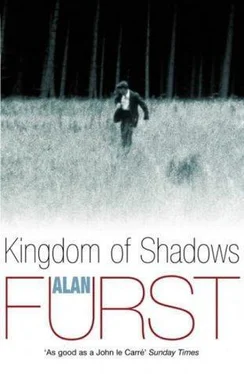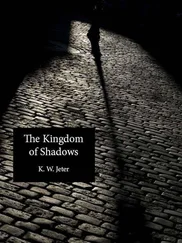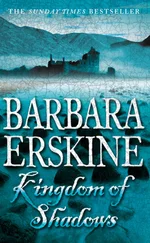Alan Furst - Kingdom of Shadows
Здесь есть возможность читать онлайн «Alan Furst - Kingdom of Shadows» весь текст электронной книги совершенно бесплатно (целиком полную версию без сокращений). В некоторых случаях можно слушать аудио, скачать через торрент в формате fb2 и присутствует краткое содержание. Жанр: Шпионский детектив, на английском языке. Описание произведения, (предисловие) а так же отзывы посетителей доступны на портале библиотеки ЛибКат.
- Название:Kingdom of Shadows
- Автор:
- Жанр:
- Год:неизвестен
- ISBN:нет данных
- Рейтинг книги:5 / 5. Голосов: 1
-
Избранное:Добавить в избранное
- Отзывы:
-
Ваша оценка:
- 100
- 1
- 2
- 3
- 4
- 5
Kingdom of Shadows: краткое содержание, описание и аннотация
Предлагаем к чтению аннотацию, описание, краткое содержание или предисловие (зависит от того, что написал сам автор книги «Kingdom of Shadows»). Если вы не нашли необходимую информацию о книге — напишите в комментариях, мы постараемся отыскать её.
Kingdom of Shadows — читать онлайн бесплатно полную книгу (весь текст) целиком
Ниже представлен текст книги, разбитый по страницам. Система сохранения места последней прочитанной страницы, позволяет с удобством читать онлайн бесплатно книгу «Kingdom of Shadows», без необходимости каждый раз заново искать на чём Вы остановились. Поставьте закладку, и сможете в любой момент перейти на страницу, на которой закончили чтение.
Интервал:
Закладка:
When he’d learned he’d be going up into Ruthenia, he’d borrowed the book from the baroness Frei’s enormous library-purchased by the Baron from universities that fell, after 1918, within the borders of other nations. “Saved from the fire,” he’d say. Morath smiled at the memory of him. A short, fat man with muttonchops who never knew himself just how much money he made with his “schemes.” For Morath’s sixteenth birthday, the Baron had taken him on an “educational ramble” to the casino at Monte Carlo, bought him a pair of diamond cuff links and a cadaverous blonde.
He’d sat by the baron’s side at the chemin de fer table and watched him write, at four in the morning, a check with an alarming number of zeros. Pale but smiling, the baron stood, lit a cigar, winked at Morath, and headed off toward the marble staircase. Ten minutes later, a black-suited fonctionnaire floated to his side, cleared his throat, and said, “The baron Frei has gone into the garden.” Morath hesitated, then stood and went quickly into the casino garden, where the baron was discovered urinating on a rosebush. He would die, ten years later, of a tropical disease contracted in the jungles of Brazil, where he’d gone to buy industrial diamonds.
Morath glanced up at the luggage rack above the seat, making sure of his leather satchel. Inside, a passport he’d received at the Louvre, now sewn into the lining of a wool jacket. Pavlo, Polanyi called the man, a man he said he’d never met. The student. Who had gotten himself into the town of Uzhorod and couldn’t get out. “A favor for a friend,” Polanyi said.
In midafternoon, the train slowed for the Moselle bridges and the station at Metz, the buildings dark with soot from the mills. Most of Morath’s fellow passengers got off-not many people traveling into Germany just then. Morath took a walk on the platform and bought a newspaper. At twilight, the train halted for the French border control. No problem for Morath, officially a resident of France.
Two hours later, the train crossed the frontier at Saarbrucken. No problem there either. The officer who knocked on the door of Morath’s compartment was pleased to see the Hungarian passport. “Welcome to the Reich,” he said. “I know you will enjoy your stay.”
Morath thanked him graciously and tried to settle down for the night. The border station was floodlit a brilliant white; wire strung on stanchions, officials, sentries, machine guns, dogs. This is for you, it said, and Morath didn’t like it. It recalled a certain Hungarian saying: “One should never voluntarily enter a room or a country the door of which cannot be opened from the inside.”
Somewhere down the line, he was joined by a pair of SS officers and spent the night drinking cognac and discussing the old Europe, the new Germany, and how to lay Hungarian women. The two young officers-political intellectuals who’d gone to university together in Ulm-had a fine time. They talked and laughed, polished their spectacles, got drunk, and fell asleep. Morath was relieved to arrive in Wurzburg, where he slept overnight at the railroad hotel and left the next morning on the train to Prague.
The Czech border police weren’t quite so happy to see him. Hungary ran espionage networks in several cities and the Czechs knew it.
“How long,” the border guard asked him, “do you plan to stay in Czechoslovakia?”
“A few days.”
“Your business here, sir?”
“To buy woodland, if possible, on behalf of a group of investors in Paris.”
“Woodland.”
“In Ruthenia, sir.”
“Ah. Of course. You are traveling to …?”
“Uzhorod.”
The guard nodded and tapped Morath’s passport with the end of a pencil. “I will stamp a one-week visa for you. Please apply at the Uzhorod prefecture if you need to extend that.”
He ate a ghastly blutwurst in the dining car, finished Bartha, managed to buy a copy of Est, the evening edition brought in from Budapest, at the station buffet in Brno. Clearly, political life was heating up. Two members of parliament had come to blows. At a workers’ march in the Tenth District, bricks thrown, people arrested. To the Editor. Sir: How can we let these liberal pansies run our lives? An editorial called for “strength, firmness, singleness of purpose. The world is changing, Hungary must change with it.” A coffeehouse by the university had burned down. TENS OF THOUSANDS CHEER HITLER SPEECH IN REGENSBURG. With photograph, on page one. Here they come, Morath thought.
Outside the window, a strange countryside. Low hills, pine forest. Sudden rivers at spring flood, the sound of the locomotive sharpening as it passed through an open gorge. At the station in the Slovakian town of Zvolen, the train stood between Warsaw to the north and Budapest to the south. Next stop, Kossice, a border town before 1918. On the platform, women holding straw baskets, their heads covered with black kerchiefs. The train climbed through snow-patched meadows, came to a village with domed churches painted lime green. In the late afternoon haze, Morath could see the Carpathians on the far horizon. An hour later he got off in Uzhorod.
The stationmaster told him there was a place he could stay in Krolevska Street. It turned out to be a yellow brick building with a sign that said hotel. The proprietor had a white eye, wore a greasy silk vest and a knitted yarmulke. “Our finest room,” he said. “The finest.” Morath sat on the straw mattress, picked the stitching from the lining of his wool jacket, and extracted the passport. Andreas Panea.
Late in the afternoon, he walked to the post office. The Czech postal clerks wore blue uniforms. On an envelope he had written Malko, Poste Restante, Uzhorod. Inside, a meaningless note-a sister had been ill, now she was better. The actual message was the address: the same as “Malko’s”, with a different name.
Now, to wait.
Morath lay on the bed and stared out the cloudy window. The finest room was bent at a strange angle; a low ceiling of wooden boards, whitewashed long ago, went in one direction, then another. When he stood up, it was only a few inches above his head. In the street, the steady sound of horses’ hooves on cobblestone. Ruthenia. Or, affectionately, Little Russia. Or, technically, Sub-Carpathian Ukraine. A Slavic nibble taken by the medieval kings of Hungary, and ever since a lost land in the northeast corner of the nation. Then, after the world war, on a rare day when American idealism went hand in hand with French diplomacy-what Count Polanyi called “a frightening convergence”-they stuck it onto Slovakia and handed it to the Czechs. Somewhere, Morath speculated, in a little room in a ministry of culture, a Moravian bureaucrat was hard at work on a little song. “Merry old Ruthenia / Land we love so well.”
At dinner, the proprietor and his wife served him jellied calf’s foot, buckwheat groats with mushrooms, white cheese with scallions, and thin pancakes with red-current jam. A bottle of cherry brandy stood on the plank table. The proprietor nervously rubbed his hands.
“Very good,” Morath said, pretending to wipe his mouth with the napkin-it had certainly been a napkin, once-and pushed his chair away from the table. He’d meant the compliment, however, and the proprietor could see that.
“Another blini, sir? Uhh, Pfannkuchen? Crepe? Blintz? ”
“Thank you, but no.”
Morath paid for the dinner and returned to his room. Lying there in the darkness, he could sense the countryside. There was a stable attached to the hotel, and sometimes the horses whickered and moved around in their stalls. The aroma, manure and rotted straw, drifted up to Morath’s room. Still cold, at the end of April. He wrapped himself up in the thin blanket and tried to sleep. Out on Krolevska Street, somebody got drunk in a tavern. Singing at first, then the argument, then the fight. Then the police, then the woman, crying and pleading, as her man was taken away.
Читать дальшеИнтервал:
Закладка:
Похожие книги на «Kingdom of Shadows»
Представляем Вашему вниманию похожие книги на «Kingdom of Shadows» списком для выбора. Мы отобрали схожую по названию и смыслу литературу в надежде предоставить читателям больше вариантов отыскать новые, интересные, ещё непрочитанные произведения.
Обсуждение, отзывы о книге «Kingdom of Shadows» и просто собственные мнения читателей. Оставьте ваши комментарии, напишите, что Вы думаете о произведении, его смысле или главных героях. Укажите что конкретно понравилось, а что нет, и почему Вы так считаете.












